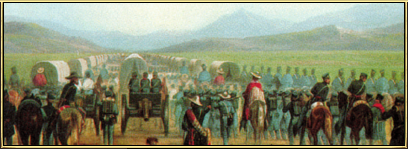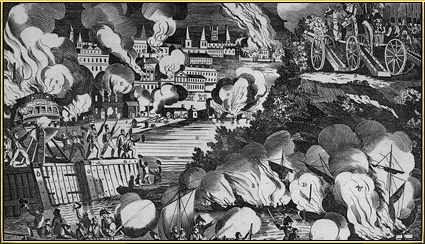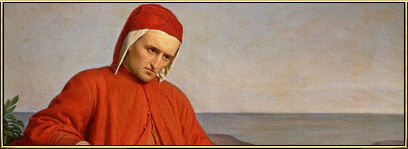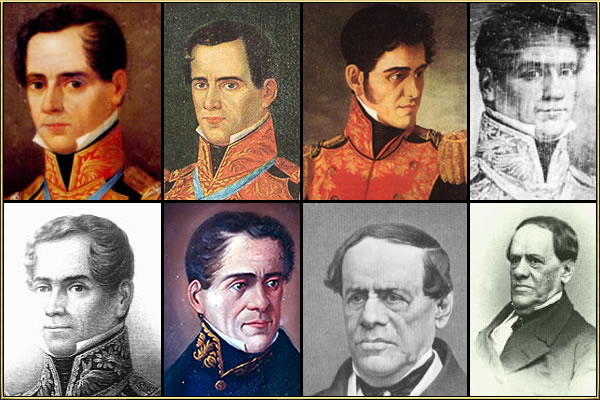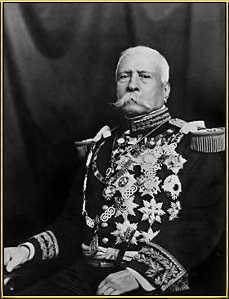Lecture Twenty: A Good Mexican (1863-'76)
"The storm of this fateful life has whistled past us and the most distinctive memories and miracles, which he brought with him, are deeply engraved in our consciousness"
Rotteck and Welcker
On 20 July 1876 Antonio Lopez de Santa Anna of Mexico died of natural causes. He was 82 years old and had spent the last decade of his life running a small farming estate south of Medellín in Columbia. It was not impoverishment but still a modest existence for a man once famed for his appetites and excesses as President of Mexico. This was an office that the former
caudillo never seriously threatened to reoccupy after his flight from the Texas and the Confederacy. To be sure, there was the odd talk of a return to power but these schemes generally proved to be the work of swindlers and glory seekers looking to drain an old and increasingly feeble man of his remaining wealth and dignity. Columbia was a retirement for Santa Anna and there, accompanied by a few friends and family, he lived a quiet and peaceful life until the end
The degree to which Santa Anna had vanished from the Mexican public's consciousness can be judged by the fact that news of his death went virtually unnoticed back home. After 1863 the few remaining
santanistas - that shrinking group of romantics and opportunists who continued to have faith in their
Generalissimo – were dismissed from their positions and removed from the political scene. Streets and towns that had been named in his honour were hurriedly rebranded; statues were torn down; and his sizeable estates in Veracruz were seized and redistributed to government loyalists. Having established that his predecessor was a traitor, the government of Porfirio Diaz set about eradicating all traces of Santa Anna from the public mind. By 1876 Don Antonio was not so much a villain in Mexican politics as a supposed irrelevancy. For someone who set so much in store by his profile and status this was perhaps the ultimate punishment
Santa Anna throughout the ages
Mexico during the 1870s did not mourn the end of the 'Age of Santa Anna' but was rather intent on consigning it to the past. As Diaz's reign (soon to be known as the
Porfiriato) firmly cemented itself, the emphasis shifted to the future and to modernisation. No more would Mexico be economically backwards and no more would she be divided; there would be Progress and Order throughout the Republic. The railroads and telegraph would be accompanied by the
gendarmerie and secret police as Mexico City finally began to dispossess the remaining local
caudillos and establish the basis of a modern nationstate. Under Diaz, Mexico, whether it liked it or not, was finally entering the modern era. Yet the figure of Santa Anna could not be dislodged from the background of this painting of progress. He had embodied the chaotic past as much as any one man could and such was the unrelenting pace of Diaz's reforms that it is tempting to divine a personal motivation behind them - a desire to surpass his predecessor, to construct a new Mexico out of the ruins left to him. It was perhaps no coincidence that the formal coronation of Diaz as Emperor of Mexico took place on 18 November 1876 – a matter of months after Santa Anna, an ardent republican to the end, finally passed away
Arguably this is Santa Anna's most lasting legacy. He had been involved in Mexican politics since colonial times and, over a startling four decades, had come to define the post-Independence era. Yet this was a time of turbulence; of civil war and coups; of economic stagnation and political corruption. He had championed the liberal cause and then betrayed it during the Civil War; he had been a regional boss who trumpeted centralism when it suited and challenged Mexico City when it did not; he had amassed immense personal wealth at the expense of the country's treasury. To be blunt, Santa Anna had come to epitomise not just Mexico's woes but the supposed inability of Mexicans to rule themselves. He had become a symbol of the Republic and its supposedly inescapable flaws. After five decades of the Republic monarchism was the only political current that had not been tarnished by his touch. Few national politicians were dismayed when Diaz cemented his grip on power during the 1860s and fewer still objected when he turned this into dynastic rule during the following decade. The Second Mexican Empire was an admission that the First Republic had failed; a failure that Santa Anna was judged to have played no small role in
Emperor José de la Cruz Porfirio Díaz
So finally we come to the question that every biographer of Santa Anna must contend with. Was Santa Anna, as Michael Meyer
et al put it, the cause of Mexico's troubles or a product of these? And did he define this era that we call the 'Age of Santa Anna' because he set the template or because he filled it so well? For Meyer there is no escaping that Santa Anna's policies were at best ineffective and at worst disastrous. His conquest of vast tracks of sparsely populated land in North America* counts for little when stacked against the chronic political and economic instability that he generated. In contrast, Will Fowler places Santa Anna squarely within the context of contemporary Spanish post-colonial politics by stressing the emergence of similar
caudillos throughout Central and South America (such as José Gervasio Artigas of Uruguay or Juan Manuel de Rosas of Argentina). Mexico was certainly not devoid of these – it can often be forgotten that many of Don Antonio's early battles were with rival
caudillos such as Anastasio Bustamante or Nicolás Bravo and even Benito Juarez and Porfirio Diaz relied heavily on strong regional support bases. Yet perhaps the great tragedy of Santa Anna is that he not only thrived under this volatile period (ultimately claiming the presidency an amazing nine times) but actually survived it. Many of his contemporaries, including his long-time associate and friend José María Tornel (1795-1853), passed or fell away in the 1850s but Don Antonio himself lived to see a new era of party/ideological politics. It was not that the
caudillo was any more venal than those who followed in his footsteps – although, in fairness, he probably was – but that in an age of 'Progress' there was simply no room for the flamboyant and anarchic reign of a man who valued his women and gambling above the affairs of state
It is this perceived decadence in the face of national decline/stagnation that so offended successive generations of politicians and historians. Santa Anna was, much like Mexico, judged to be weak and thus referred to only with the scorn reserved for the backwards or primitive. Any possibility that this judgement be revised in the face of the cold crimes that the Empire and its successors would commit in the name of 'Progress and Order' were dashed when Santa Anna became, unfairly, labelled a forerunner of fascism. This was a product of the brief rehabilitation of
Benefactor of the Fatherland during the 1930s as the so-called neo-
santanista faction of the National Synarchist Union sought to forge Santa Anna's nationalism and anti-parliamentarianism into an intellectual heritage for their own perverted politics. While its true that Don Antonio scorned political parties as inherently divisive, to label him as a fascist is absurd. Yet the sole other notable positive evaluation of his reign lies in the bizarre
Cult of Santa Anna that has developed and spread throughout the slums of Mexico City and Veracruz in the past few decades. How would the famously self-aggrandising Santa Anna react to the knowledge that he was being worshiped as a demi-god today? Its tempting to imagine him smiling wryly, even if the opinions of the lower classes meant little to him
Yet this was Santa Anna, a man of contradictions. He craved popularity yet his reigns did little for the masses; a soldier for Spain he proved amongst the staunchest defenders of the Republic; a man who craved power yet had little appetite for governance; a convinced conservative who championed liberalism; a paragon of liberalism who betrayed the cause; a regional
jeffe politico who paraded on the national stage; a proud
jarocho of Veracruz who proved intensely loyal to nation; devoted family man and relentless womaniser; a conqueror of vast but worthless lands; and a founder of the Republic with no qualms of dismissing its elected assemblies. This and more was Santa Anna
How is one to judge such a man? How can one judge such a man? Given that we have invoked the spirit of Santa Anna above perhaps it is appropriate to give him if not the benefit of the doubt then at least the last words in this discussion. One of his last political letters, written in 1869 before his declining mental health made a political revival impossible, was addressed directly to the Mexican people. An extract serves as a fitting tribute to a man who even towards the end remained self-serving, noble, and extremely conscious of his place in history:
'…It is not strange that I am not yet judged with the impartial judgment of history; that day has yet to come. When it does, then can be applied to me the words of Montesquieu: "The errors of statesmen are not always voluntary; they are often the necessary consequences of the situations in which they are placed, where difficulties reproduce difficulties"
My enemies have seen in me only a Sulla; but now my greatest desire is to prove to them that I should not be compared to that ferocious Roman… I have already once voluntarily given up public position when I still had powerful means for sustaining myself. Now it is my intention to cooperate towards the maintenance of the constitutional republican government in the capital of Mexico…
I do not doubt that the people of this country will in the end benefit by the experience we have had. I am not either conservative or liberal; I am only a Mexican, and I open my arms to all my countrymen.
All Mexicans, forgetting my political errors, do not deny me the only title I wish to donate to my children: that of having been a Good Mexican'
A. L. de Santa Anna
-----
*Today the Indian states of the North American plains are perhaps the only real group to share an almost uniformly positive view of the Generalissimo. For many his deliverance of them from the United States, in favour of a largely disinterested and distant Mexico City, remains a pivotal moment in their modern history



